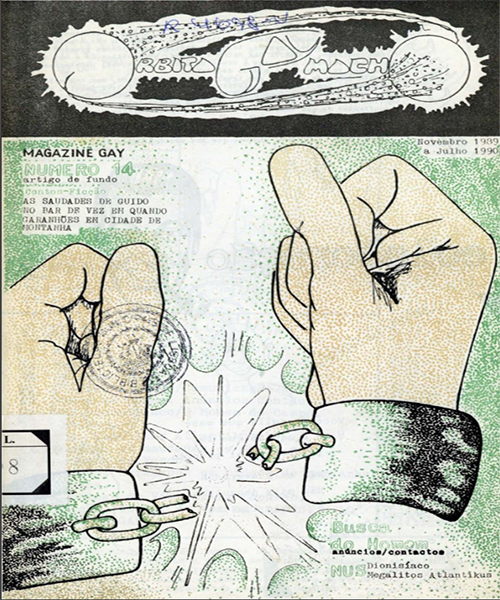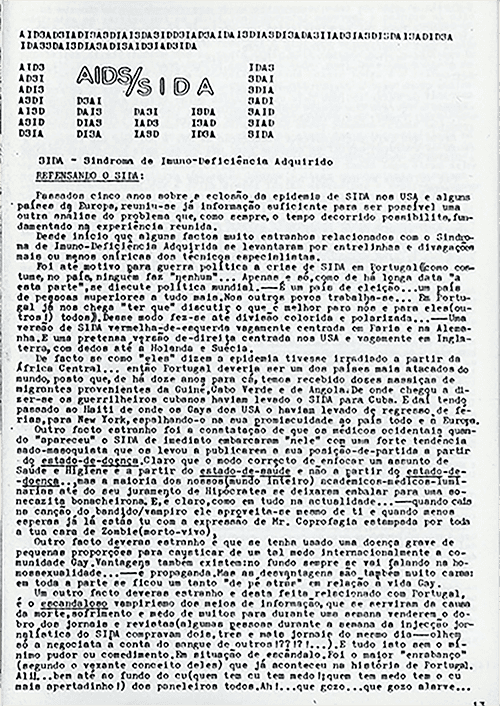Joana Matias
Tradition says that when the first Portuguese celebrity rumored to have contracted HIV, queer pop icon António Variações, passed in 1984, the fear of contagion was by then so entrenched that the authorities ordered his coffin be sealed. But gay men fortunate enough to get their hands on a rare A5 photocopied publication in 1987 could be comforted in reading that, at least according to its creators, “AIDS is an illness like any other that people should not be embarrassed by. The AIDS patient can be treated like any other.” Against a backdrop of misinformation, homophobia, and sex-negativity, a discrete members’ club named GayClub, through its publication Órbita Gay Macho, promoted safe sex, curated news from abroad, and warned against media hysteria. Equally, the limitations of its efforts reflect the enormous difficulties of grassroots, small-scale responses to the epidemic in this period.

Órbita Gay Macho is nothing short of a treasure trove. It is the only known gay periodical to document the aftermath of key events such as the revolution of 1974 (a military coup which brought an end to the longest-lived dictatorship in Europe), the decriminalization of homosexuality in 1982, and the onset of the HIV/AIDS epidemic. From 1982 to 1993, Órbita’s seventeen issues provided news both local and global, personal ads, original erotic fiction and photos, as well as an abundance of essays on travel, New Age pseudoscience, and gay politics to its subscribers. It served as a mouthpiece for GayClub, a private members’ organization for gay men based in Lisbon founded in 1981. Órbita is one of the only traces of its existence. Though much of the club’s activity remains to be unearthed, its pages boast of an ambitious output that included a radio show broadcast in 1988, materials on safe sex practices, and a pamphlet-size translation of Geoff Mains’ Urban Aboriginals: A Celebration of Leather Sexuality. They also preserve GayClub’s interactions with peers abroad and attempts to participate in international efforts for gay rights.
Though characterised in its own presentation as well as in interviews for other media as a publication for (all) gay men, much of Órbita focused on promoting a particularly macho vision of queer masculinity. This exploration of gender and sexuality was channelled through the framework of leather culture. Aside from the Mains translation, this includes a recurrent advertisement for a leathersex club, a titillating account of attendance at an annual Oktoberfest leathermen’s meeting in Munich in 1986, and an invitation to participate in Mr Leather International 1993. This connection to a global leather and kink culture was likely the influence for the knowledge and promotion of safe sex practices as, according to both Mains himself (a scientist by trade whose Urban Aboriginals became a seminal text on the subculture) and historian Gayle Rubin in “Elegy for the Valley of Kings: AIDS and the Leather Community in San Francisco, 1981-1996“, queer leather and kink cultures were by design uniquely poised to encourage safety and protocol in sex for the broader community. GayClub’s promotion of safe sex was so ahead of its time, they invented a translation for the term – “sexo salvo” (“saved” sex) – unique to Órbita, since disappeared from the historical record and replaced by the widespread term “sexo seguro” (safe sex).

Writing about lesbian history, Cait McKinney terms this kind of labor “information activism”: the often precarious work (in which paper media, in the pre-Internet age, was central) of sharing the sort of knowledge that makes living a queer life possible. The zine’s coverage of the epidemic was nothing short of exhaustive. It included reporting on local developments and statistics, as well as piecing together and translating information from abroad – from new treatments such as AZT (azidothymidine), research into vaccines, government responses, and naturopathic treatments. No other queer organizations are known to have engaged with the epidemic to this degree in the 1980s, and the first NGOs dedicated to HIV/AIDS campaigning, prevention and/or support would only appear in the early 1990s. The first official campaigns opted not to target any individual at-risk populations, a move GayClub first decried, then later agreed with, deciding that targeting the general public made any efforts specific to minorities “unnecessary”.
Yet the impact, however small in scale (print runs were of a few dozen early in its life, up to a few thousand in the last issues), of providing a gay audience with up-to-date dedicated information ignored by mainstream media in favor of promoting hysteria – a recurrent criticism – cannot be minimized. Equally, Órbita would differ both from public guidelines on prevention as well as gay magazines later in the 1990s in not promoting monogamy as a method of prevention, insisting instead on shared knowledge of sexual histories between however many people one wished to engage with sexually. However, despite its critique of media hysteria, Órbita often replicated a sense of information overload. Some of the coverage consisted of questionable theories on the origins of the virus, from human experimentation to the effects on the “bioenergetic fields” of marginalized communities. The haphazard nature of these research efforts are suggestive of a distrust of deficient government and clinical responses to the epidemic, as well as the difficulties of processing rapidly developing scientific data as experienced by those on the frontlines of the fight against the virus globally.
Órbita exemplifies many of the challenges in investigating queer ephemera: despite its relatively recent existence, its survival rate is low and many of those involved – both producers and readers – have since passed, no doubt due at least in part to the HIV/AIDS crisis. We might never uncover the stories of the men implicated in this decade-long labor of love, nor its impact on subscribers. Yet like much queer ephemera, it’s left quiet echoes. In a feature on HIV/AIDS produced by public Portuguese broadcaster RTP in 1989, we are introduced to two young men, Vítor Hugo and Serafim. Vítor is HIV-positive and has been disowned; Serafim, we are told via voice-off, is his only friend and support, met through “a gay club”. The feature centers on Vítor’s harrowing story, lightened only by his friendship with Serafim, who picks him up from at the bus stop with a dazzling smile. The narrator notes, with some puzzlement, how his “biggest friend, the only one who is not afraid of AIDS”, is unfazed at the prospect of sex together: Serafim shrugs and says, “the only thing is you have to take precautions, like anybody else”. The segment ends in a nightclub. On stage, a drag queen recites the José Régio poem “Cântico Negro”, a modernist manifesto culminating with the lines “I don’t know which way I’m going/I don’t know where I’m going/But I know I’m not going that way”. The two men, brought together by queer technologies of survival – whether GayClub or any other number of similarly named contact services – hold hands and watch, somber and enraptured.
 Joana Matias is a doctoral student in history and researcher at the Institute of Contemporary History, NOVA School of Social Sciences and Humanities / IN2PAST — Associate Laboratory for Research and Innovation in Heritage, Arts, Sustainability and Territory. They are the recipient of a doctoral grant from the Portuguese Foundation for Science and Technology (FCT). Their thesis project is a cultural history of queer identity and politics in contemporary Portugal through the gay and lesbian press; their research interests include the history of gender and sexuality, queer material cultures, and uses of the past. Joana tweets from @frctrx
Joana Matias is a doctoral student in history and researcher at the Institute of Contemporary History, NOVA School of Social Sciences and Humanities / IN2PAST — Associate Laboratory for Research and Innovation in Heritage, Arts, Sustainability and Territory. They are the recipient of a doctoral grant from the Portuguese Foundation for Science and Technology (FCT). Their thesis project is a cultural history of queer identity and politics in contemporary Portugal through the gay and lesbian press; their research interests include the history of gender and sexuality, queer material cultures, and uses of the past. Joana tweets from @frctrx
Both images are the property of GayClub/JLRES. Source: National Library of Portugal. Photo: Author’s own.

NOTCHES: (re)marks on the history of sexuality is licensed under a Creative Commons Attribution-NonCommercial-NoDerivatives 4.0 International License.
Based on a work at www.notchesblog.com.
For permission to publish any NOTCHES post in whole or in part please contact the editors at NotchesBlog@gmail.com




